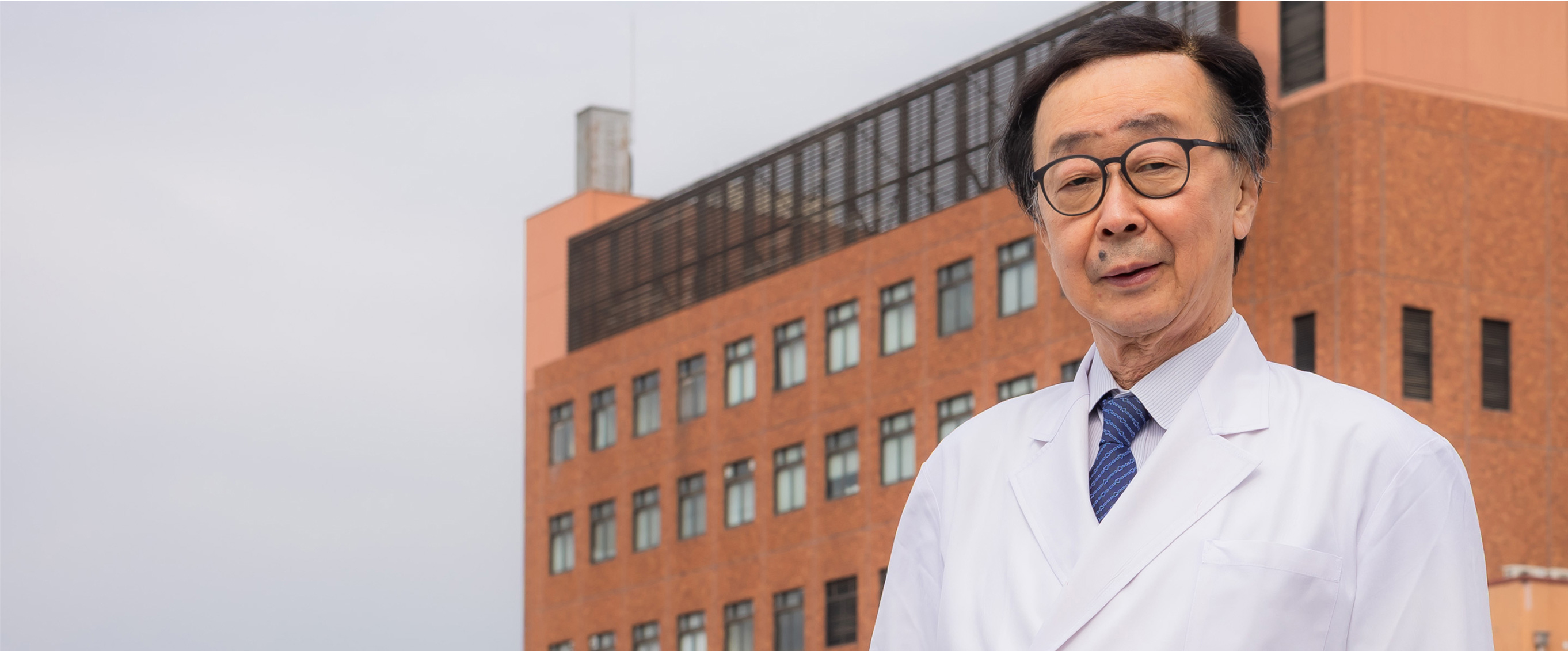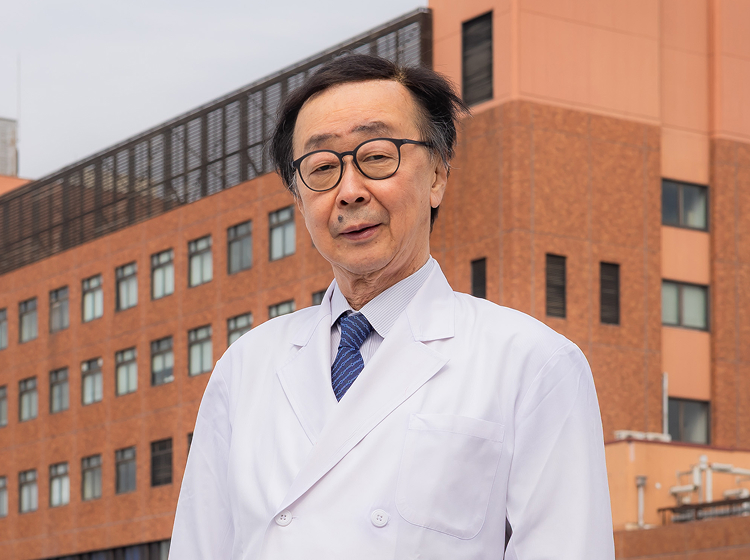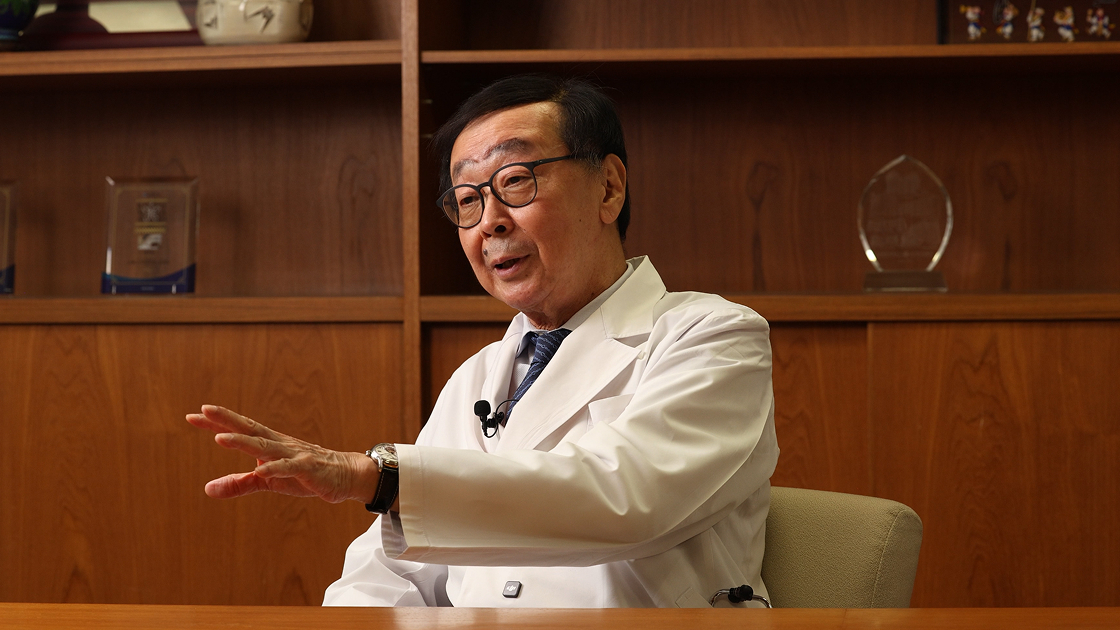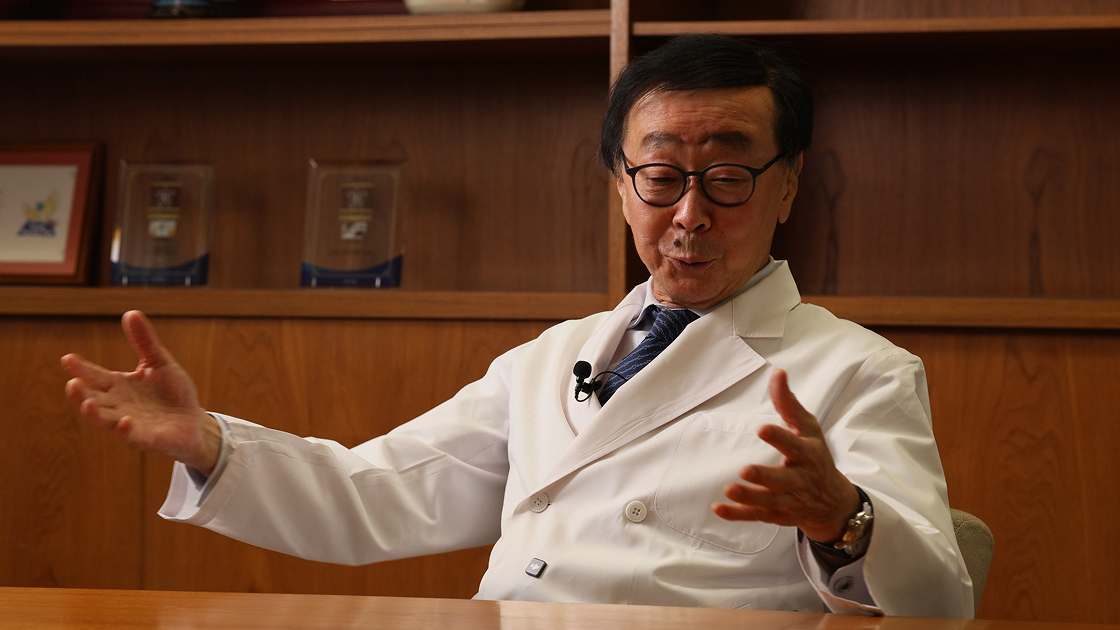Survey or Interview東田 有智
「人は力」
患者の痛みを理解し断らない診療を
“People are Our Strength”— delivering medical care that truly understands patients’ pain and never turns anyone away.


東田 有智
Interview
TOHDA Yuji
病院長
Director
東田有智が近畿大学医学部を選んだのは、ひょんなきっかけだった。
ある日、近畿大学が医学部を設置すると聞いた。試験会場は近畿大学の本学のある東大阪市だった。
「ぼくの家の近所です。模試代わりに受けることにした。軽い持ちで受験して、昼間の休憩時間にはパチンコして、また戻った」
第一志望の名古屋大学は、希望学部を複数選ぶことができ農学部に合格。受験勉強に疲れていた東田は、医者になることを諦めて、農学部に行こうかと思った。もう一つの選択肢は、軽い気持ちで受験し、合格していた近畿大学医学部だった。
「親からは(国立大学と違って学費が)高いけれど、お前は行きたいのかと聞かれた。ぼくはやはり医者になりたかった。行きたいと言ったら、分かったと」
医学部のある大阪狭山市は同じ大阪府であるが、未知の場所だった。
「南海(電鉄)沿線に行くことはなかった。うちから通うには一度、なんば(駅)に出ないといけない。帰るときも同じ」
だいたい、なんばで降りたら、そのまま帰れへんやないですか、と笑う。繁華街で遊んでしまうという意味だ。医学部一期生は110人。入学時点では、近大病院は完成しておらず、大阪狭山キャンパスにいる学生は、新入生のみ。みな顔見知りで和気藹々とした雰囲気だった。
医学部自体が手探り状態で、当初はカリキュラムが不安定だったという。2年生の5月、近大病院が完成。年々、下級生が増えて、キャンパスらしくなった。
東田は漠然と将来は外科医になるつもりだった。そんなある日のこと。にぎやかな雰囲気が好きな東田は、同級生たちと食事をするのがほとんどだった。その日に限っては、友人がおらず一人で大学近くの店に入った。
「一膳飯屋みたいなところに、第四内科の教授がいた。一緒に飲まないかと誘われて、そのまま家に連れて行かれた。そこでさらに酒を飲みました」
それが第4内科の教授、中島重徳との出会いだった。日本の呼吸器・アレルギー内科の第一人者の一人である。
「中島先生の第4内科に来ないかと誘われた。一宿一飯の恩義があるから、断りにくい。ぼくは外科、中でもがん治療がやりたかった。そこで(中島の専門である)喘息はやりません、肺がんをやらせてくれるならば第4内科に入りますって言ったんです」
かつて内科は「数字」で診療科を区別していた。「ナンバー内科」である。近畿大学医学部の第4内科は、〝第1〟から〝第3〟からかなり遅れて設置された。専用の病棟はなく、臨床研修では他の病棟を回ることになった。医局員が少ないこともあって、早くから実地の経験を積むことが出来たと東田は振り返る。
ただ、当初の思いである、がんを学びたいという気持ちは消えなかった。そのため、国立がんセンターと自ら話をつけて出向していた時期もある。そんな東田が、がんではなく呼吸器――喘息を自分の道と決めたのは、医学部卒業から11年後、91年のことだった。
ある日、近畿大学が医学部を設置すると聞いた。試験会場は近畿大学の本学のある東大阪市だった。
「ぼくの家の近所です。模試代わりに受けることにした。軽い持ちで受験して、昼間の休憩時間にはパチンコして、また戻った」
第一志望の名古屋大学は、希望学部を複数選ぶことができ農学部に合格。受験勉強に疲れていた東田は、医者になることを諦めて、農学部に行こうかと思った。もう一つの選択肢は、軽い気持ちで受験し、合格していた近畿大学医学部だった。
「親からは(国立大学と違って学費が)高いけれど、お前は行きたいのかと聞かれた。ぼくはやはり医者になりたかった。行きたいと言ったら、分かったと」
医学部のある大阪狭山市は同じ大阪府であるが、未知の場所だった。
「南海(電鉄)沿線に行くことはなかった。うちから通うには一度、なんば(駅)に出ないといけない。帰るときも同じ」
だいたい、なんばで降りたら、そのまま帰れへんやないですか、と笑う。繁華街で遊んでしまうという意味だ。医学部一期生は110人。入学時点では、近大病院は完成しておらず、大阪狭山キャンパスにいる学生は、新入生のみ。みな顔見知りで和気藹々とした雰囲気だった。
医学部自体が手探り状態で、当初はカリキュラムが不安定だったという。2年生の5月、近大病院が完成。年々、下級生が増えて、キャンパスらしくなった。
東田は漠然と将来は外科医になるつもりだった。そんなある日のこと。にぎやかな雰囲気が好きな東田は、同級生たちと食事をするのがほとんどだった。その日に限っては、友人がおらず一人で大学近くの店に入った。
「一膳飯屋みたいなところに、第四内科の教授がいた。一緒に飲まないかと誘われて、そのまま家に連れて行かれた。そこでさらに酒を飲みました」
それが第4内科の教授、中島重徳との出会いだった。日本の呼吸器・アレルギー内科の第一人者の一人である。
「中島先生の第4内科に来ないかと誘われた。一宿一飯の恩義があるから、断りにくい。ぼくは外科、中でもがん治療がやりたかった。そこで(中島の専門である)喘息はやりません、肺がんをやらせてくれるならば第4内科に入りますって言ったんです」
かつて内科は「数字」で診療科を区別していた。「ナンバー内科」である。近畿大学医学部の第4内科は、〝第1〟から〝第3〟からかなり遅れて設置された。専用の病棟はなく、臨床研修では他の病棟を回ることになった。医局員が少ないこともあって、早くから実地の経験を積むことが出来たと東田は振り返る。
ただ、当初の思いである、がんを学びたいという気持ちは消えなかった。そのため、国立がんセンターと自ら話をつけて出向していた時期もある。そんな東田が、がんではなく呼吸器――喘息を自分の道と決めたのは、医学部卒業から11年後、91年のことだった。
First graduating class of Kindai University Faculty of Medicine,
Founding Professor of the Department of Respiratory and Allergy Medicine, Hospital Director
––The ‘eldest son’ of the battling Kindai University Faculty of Medicine
It was by a curious twist of fate that TOHDA Yuji chose Kindai University Faculty of Medicine.One day, he heard that Kindai University was establishing a medical faculty. The entrance exam site was in Higashi-Osaka City, where the university’s main campus was located.
"It was right near my house," he recalls. "I decided to take the exam as if it were just a practice test. I went in with a light heart, even played pachinko during the lunch break, and then went back to finish the exam."
His first choice had been Nagoya University, where applicants could list multiple preferred faculties. He failed to gain admission to the Faculty of Medicine there but passed for his second choice, the Faculty of Agriculture. Exhausted from the long months of exam study, TOHDA seriously considered abandoning the idea of becoming a doctor and instead pursuing agriculture. His other option was Kindai University Faculty of Medicine, which he had taken on a whim—and passed.
"This place is expensive compared to a national university," he told his parents. They asked, "But do you truly want to go?" "I realized that I did still want to become a doctor. When I said yes, they agreed," TOHDA recalls.
Although the medical school was in Osaka Prefecture, its location in Sayama was unfamiliar to him.
"I never had any reason to go out on the Nankai Line. From my house, I had to go all the way through Namba Station to get there—and coming home was the same. Of course, once you get off at Namba, you never make it straight back home," he says with a laugh, hinting at the temptations of the busy entertainment district.
The inaugural class of the new Kindai University Faculty of Medicine consisted of 110 students. At the time of enrollment, Kindai University Hospital had not yet been completed, and only the new students occupied the Osaka-Sayama campus. Everyone knew each other, and the atmosphere was warm and friendly. The faculty itself was still finding its footing, and in the early days the curriculum was somewhat unsettled. In May of his second year, the new university hospital was finally completed, and with each incoming class the campus gradually took on the air of a true medical school.
TOHDA Yuji had vaguely assumed that he would one day become a surgeon. Then came a turning point. Outgoing and fond of lively company, he usually ate with classmates. But on this particular day, finding himself without a companion, he stepped alone into a small restaurant near the university.
"It was a place like a humble rice-bowl shop. There sat the professor of the Fourth Department of Internal Medicine. He invited me to join him for a drink. Afterward, he even took me back to his home, where we drank more together," TOHDA recalls.
That chance encounter became his introduction to Professor NAKAJIMA Shigenori, a pioneer in respiratory and allergy medicine in Japan.
"Professor NAKAJIMA asked me to join the Fourth Department of Internal Medicine. Out of gratitude for his hospitality that night, it was hard to refuse. But I wanted to do surgery, especially cancer treatment. So, I told him, ‘I won’t do asthma. If you let me work on lung cancer, I’ll join the Fourth Department.’"
In those days, internal medicine departments were identified by numbers and were known as the “numbered departments.” The Fourth Department at Kindai University Faculty of Medicine had been established considerably later than the first three. It had no dedicated ward of its own, so students rotated through other departments’ wards during training. Yet because the department was small, TOHDA was able to gain hands-on experience earlier than most.
Even so, he never lost sight of his original ambition to study cancer. At one point, he even arranged on his own to train at the National Cancer Center. It was not until 1991, eleven years after graduating from medical school, that TOHDA finally decided to make respiratory medicine, and specifically asthma, his life’s work.

91年8月、東田はアメリカのメイヨー・クリニックに留学した。メイヨークリニックは、ミネソタ州ロチェスター市を本拠地とする世界屈指の医療機関である。東田が師事したジェラルド・グライヒは、免疫学、アレルギーの権威であり、世界中から留学生が集まっていた。
「最初にびっくりしたのは物の考え方。ノーベル賞を獲りたいとか、良い意味で野心を持った人間が集まっていた。ぼくみたいに、留学ありき、遊びに行くような人間とは全く違っていた。やっぱり勉強しなあかんという気になりましたね」
東田は30代後半に差し掛かっていた。エンジンが掛かったのは遅い部類に入るだろう。
「喘息という病態よりも免疫アレルギーの基礎研究に取り組みました。そこで喘息という疾患の奥の深さを知りました」
喘息とは、発作性の呼吸困難を伴うアレルギー性炎症である。本来、無害であるはずの抗原に対する免疫反応によって引き起こされる疾患だ。引き鉄になるのは、家の埃、ペットの毛など多岐に渡る。厄介なのはその免疫反応が、一部の人間にしか起こらないことだ。
「当時は、たかが喘息という風潮があった。喘息を持っているお子さんが、ひどくなったので学校を休みますというのは普通でした。でも、本来は喘息であっても普通の生活が送れなければならない」
喘息は、多くの人間が罹患する可能性があるコモンデジーズ(common diseases)である。たかが、と言われながら病態が完全に解明されていない。困っている人を助けたいと強く思った。
約2年間のアメリカ留学の後、日本に帰国。近畿大学医学部の後輩たちの指導に深く関わることになった。
「(大学院の)学位を取らせないといけない。自分の性格もあるんでしょうけど、下の面倒をみなきゃいけないと思った。後輩たちの研究を手伝いながら、喘息に入り込んでいったんです」
近畿大学医学部1期生――近畿大学医学部の〝長男〟としての責任感である。
2002年、『呼吸器・アレルギー内科』を設立し、初代教授となった。その後、近畿大学医学部、附属病院の要職を経て、2016年に近畿大学医学部附属病院の病院長に就任した。
大学に入ったときは、病院長はおろか、大学に残ることすら想像していなかった、経験を積んで開業医になれればいいなと考えていたぐらいですと東田は笑う。
そんな彼の背中を押したのは、やはり〝長男〟としての思いだった。近大病院の経営はあまり良い状態ではなかったのだ。
「最初にびっくりしたのは物の考え方。ノーベル賞を獲りたいとか、良い意味で野心を持った人間が集まっていた。ぼくみたいに、留学ありき、遊びに行くような人間とは全く違っていた。やっぱり勉強しなあかんという気になりましたね」
東田は30代後半に差し掛かっていた。エンジンが掛かったのは遅い部類に入るだろう。
「喘息という病態よりも免疫アレルギーの基礎研究に取り組みました。そこで喘息という疾患の奥の深さを知りました」
喘息とは、発作性の呼吸困難を伴うアレルギー性炎症である。本来、無害であるはずの抗原に対する免疫反応によって引き起こされる疾患だ。引き鉄になるのは、家の埃、ペットの毛など多岐に渡る。厄介なのはその免疫反応が、一部の人間にしか起こらないことだ。
「当時は、たかが喘息という風潮があった。喘息を持っているお子さんが、ひどくなったので学校を休みますというのは普通でした。でも、本来は喘息であっても普通の生活が送れなければならない」
喘息は、多くの人間が罹患する可能性があるコモンデジーズ(common diseases)である。たかが、と言われながら病態が完全に解明されていない。困っている人を助けたいと強く思った。
約2年間のアメリカ留学の後、日本に帰国。近畿大学医学部の後輩たちの指導に深く関わることになった。
「(大学院の)学位を取らせないといけない。自分の性格もあるんでしょうけど、下の面倒をみなきゃいけないと思った。後輩たちの研究を手伝いながら、喘息に入り込んでいったんです」
近畿大学医学部1期生――近畿大学医学部の〝長男〟としての責任感である。
2002年、『呼吸器・アレルギー内科』を設立し、初代教授となった。その後、近畿大学医学部、附属病院の要職を経て、2016年に近畿大学医学部附属病院の病院長に就任した。
大学に入ったときは、病院長はおろか、大学に残ることすら想像していなかった、経験を積んで開業医になれればいいなと考えていたぐらいですと東田は笑う。
そんな彼の背中を押したのは、やはり〝長男〟としての思いだった。近大病院の経営はあまり良い状態ではなかったのだ。
The engine really started running in his late thirties.
In August 1991, TOHDA Yuji traveled to the United States to study at the Mayo Clinic, one of the world’s leading medical institutions based in Rochester, Minnesota. There he trained under, Gerald Gleich, a renowned authority in immunology and allergy, whose laboratory attracted students from across the globe."The first thing that struck me was the way people thought. These were people with real ambition—some even openly said they wanted to win a Nobel Prize. Compared to them, I was just someone who had come abroad for the experience, almost like going on a trip. It really made me realize I had to take my studies more seriously,” he reflects.
At that time, TOHDA was already in his late thirties. By his own admission, he was a late starter.
"Rather than focusing directly on asthma as a condition, I engaged in basic research on immunology and allergy. And through that, I came to understand just how profoundly complex asthma really is."
Asthma is an allergic inflammation accompanied by paroxysmal shortness of breath. It is triggered by immune reactions to antigens that, under normal circumstances, should be harmless. The causes are wide-ranging—from household dust to pet hairs. What makes it especially troublesome is that such immune reactions occur only in certain individuals.
"At the time, there was still the attitude of, ‘It’s just asthma.’ It was common to hear of children with asthma having to miss school when their symptoms got worse. But in truth, even with asthma, one should be able to live a normal life."
Asthma is one of the so-called common diseases that many people may suffer from. Yet despite being so widespread, its pathology remained far from fully understood. That fact only deepened TOHDA’s conviction: he wanted to help those who were struggling.
After about two years of study in the United States, TOHDA returned to Japan, where he became deeply involved in mentoring his juniors at Kindai University Faculty of Medicine.
"I felt I had a responsibility to help the graduate students earn their degrees. Maybe it’s just my personality, but I felt a responsibility to look after those who came after me. By helping my juniors with their research, I found myself drawn deeper and deeper into the study of asthma."
As a member of the very first graduating class of Kindai University Faculty of Medicine, TOHDA Yuji carried with him a strong sense of responsibility as one of the school’s “eldest sons.”
In 2002, he established the Department of Respiratory and Allergy Medicine, becoming its inaugural professor. Over the years, he went on to hold key positions both at the faculty and at the hospital, and in 2016 he was appointed Director of Kindai University Hospital.
“When I first entered medical school, I never imagined I would stay on at the university, let alone become hospital director. At the time, I thought that if I could just gain experience and eventually open my own private practice, that would be enough,” he says with a laugh.
What ultimately pushed him forward, however, was that same feeling of obligation as an “eldest son.” At the time, the financial condition of Kindai University Hospital was far from healthy, and someone had to take responsibility for setting it right.

病院長就任後、東田は二つの方針を立てた。一つは、来た患者さんを全部受けることだ。
「手が足りない、という理由で患者さんを断っていたんです。人間は楽をしたいものなんです。そこで患者さんを断ったときは、なぜ、断ったのかという理由を提出させた。納得できないときは担当者と話をした。そうした患者さんを受けるのが当たり前になっていった」
もう一つは経費削減である。これについては知見を持つ外部の力を借りた。そして、近隣病院との連携を深めた。病院長の任期は2年である。東田の2期目に経営は黒字転換した。
病院経営が落ち着いた頃、新たな試練が立ちはだかる。新型コロナウイルスである――。
「第一報を聞いたとき、どのくらいパワーがあるウイルスなのか、敵が分からない。とにかく大変な病気だと思いました」
重症患者は病原体が漏れないように気圧を下げる『陰圧室』で隔離し、時にECMO(体外式膜型人工肺)を使用する。こうした環境を整えられる医療機関は限られている。東田は大阪府内にある5つの大学病院の病院長が集まった会議で、「大学病院は重症患者を受け入れよう」と足並みを揃えることにした。そして近畿大学病院の救命救急を止める事なく、一部の病棟をコロナ対応に充てた。
この時点では空気感染するかどうかの知見もない。医療従事者は自らの身への不安はあった。
東田はコロナ対応の医師、看護師たちを集めてこう言った。
――うちの救命救急は南河内のセーフティネットだ。止めてしまうと死人が出る。助かる命が助からない。救命救急は通常の業務を行い、コロナは呼吸器科が診る。
これは誰かがやらなければならないのだと力を込めた。同時に必要な機器の購入も決めた。そして、何か起これば、自分に連絡をするようにと寝ているときも携帯電話を枕元に置いた。時間が許す限り現場に出向いた。
近大病院が新型コロナウイルス罹患者を受け入れていることが報じられると、多くの物資の寄附があった。中には東田宛のものも少なくなかった。みなが支えてくれているのだと心強く感じたという。近大病院では、新型コロナウイルスを理由とした離職者はゼロだった。
「人が力やからな」と東田は言う。
「手が足りない、という理由で患者さんを断っていたんです。人間は楽をしたいものなんです。そこで患者さんを断ったときは、なぜ、断ったのかという理由を提出させた。納得できないときは担当者と話をした。そうした患者さんを受けるのが当たり前になっていった」
もう一つは経費削減である。これについては知見を持つ外部の力を借りた。そして、近隣病院との連携を深めた。病院長の任期は2年である。東田の2期目に経営は黒字転換した。
病院経営が落ち着いた頃、新たな試練が立ちはだかる。新型コロナウイルスである――。
「第一報を聞いたとき、どのくらいパワーがあるウイルスなのか、敵が分からない。とにかく大変な病気だと思いました」
重症患者は病原体が漏れないように気圧を下げる『陰圧室』で隔離し、時にECMO(体外式膜型人工肺)を使用する。こうした環境を整えられる医療機関は限られている。東田は大阪府内にある5つの大学病院の病院長が集まった会議で、「大学病院は重症患者を受け入れよう」と足並みを揃えることにした。そして近畿大学病院の救命救急を止める事なく、一部の病棟をコロナ対応に充てた。
この時点では空気感染するかどうかの知見もない。医療従事者は自らの身への不安はあった。
東田はコロナ対応の医師、看護師たちを集めてこう言った。
――うちの救命救急は南河内のセーフティネットだ。止めてしまうと死人が出る。助かる命が助からない。救命救急は通常の業務を行い、コロナは呼吸器科が診る。
これは誰かがやらなければならないのだと力を込めた。同時に必要な機器の購入も決めた。そして、何か起これば、自分に連絡をするようにと寝ているときも携帯電話を枕元に置いた。時間が許す限り現場に出向いた。
近大病院が新型コロナウイルス罹患者を受け入れていることが報じられると、多くの物資の寄附があった。中には東田宛のものも少なくなかった。みなが支えてくれているのだと心強く感じたという。近大病院では、新型コロナウイルスを理由とした離職者はゼロだった。
「人が力やからな」と東田は言う。
Unless there are many graduates of the Kindai University Faculty of Medicine, the ‘university’ and the ‘hospital’ will not improve.
After assuming the role of hospital director, TOHDA Yuji set out two guiding principles. The first was to accept every patient who came to the hospital.“At the time, patients were being turned away on the grounds that there wasn’t enough capacity. But people naturally tend to take the easier path. So, whenever a patient was refused, I required the staff to submit a reason. If I wasn’t convinced, I spoke directly with the person responsible. Gradually, it became the norm to accept patients rather than turn them away.”
The second principle was cost reduction, for which he enlisted the expertise of external specialists. At the same time, he also strengthened collaboration with nearby hospitals. The term of office for hospital director was two years, and by his second term, the hospital’s finances had turned into the black.
Just as stability returned, however, an unprecedented challenge arose: COVID-19.
“When I first heard the initial reports, I had no idea how powerful the virus was or exactly what we were up against. But I immediately sensed it would be serious.”
Severe cases required isolation in negative-pressure rooms to prevent leakage of the pathogen, and sometimes treatment with ECMO (extracorporeal membrane oxygenation) was necessary. Only a limited number of institutions were equipped to provide such care. At a meeting of the directors of the five university hospitals in Osaka Prefecture, TOHDA proposed that “university hospitals must take in the severe cases,” and the group reached a consensus. At Kindai University Hospital, emergency services were continued without interruption by relocating part of the emergency department and dedicating a ward to COVID-19 patients.
At that time, it was not even known whether the virus spread through airborne transmission, and medical staff naturally felt anxious for their own safety. To address this, TOHDA gathered the doctors and nurses working on the front lines and told them:
“Our emergency department is the safety net for Minamikawachi. If we shut it down, people will die—lives that could have been saved will be lost. Emergency medicine must continue as usual, while COVID-19 will be handled by the Department of Respiratory Medicine.”
It was, he emphasized, something that someone had to do. At the same time, he authorized the purchase of necessary equipment. He instructed staff to contact him directly should anything occur, keeping his cell phone by his pillow even while he slept. Whenever time allowed, he personally visited the frontline.
When the news spread that Kindai University Hospital was treating COVID-19 patients, donations of supplies began to pour in—many addressed personally to TOHDA Yuji. He recalls feeling heartened, realizing that everyone was standing behind them in support. Remarkably, not a single staff member left the hospital because of COVID-19.
“People are the true strength,” TOHDA affirms.
When asked what kind of students he hopes will come to Kindai University Faculty of Medicine in the future, TOHDA replies quietly, “Well, people who dislike people probably aren’t suited or this profession.”
“A doctor is paid to provide treatment, and then the patient says, ‘Thank you.’ There’s no other job like it. Patients come to us because something is wrong, because they are in an abnormal state. Even the sound of slippers on the floor can be irritating in that condition. If you stand there grinning carelessly, it will only make them angry. You must be able to understand a person’s pain.”
“I don’t tell young people to do this now, but when I was young, I once stayed in the hospital for about three weeks straight. Because I didn’t have the skills, all I could give back to patients was my sincerity. If something happened when I wasn’t there, I worried. It was easier just to stay by their side. And because I knew so little, I had no choice but to study.”
For TOHDA, curiosity remains essential. “Children are always asking why things are the way they are. I want students who can keep that same sensitivity alive within them.”
TOHDA is also a pioneer among graduates of Kindai University Faculty of Medicine, carving a path for those who would follow.
“Unless there are many Kinki University graduates succeeding, the university and hospital cannot grow stronger. I wrote papers desperately, motivated by not wanting to lose to those from other universities. I never wanted people to say I only became a professor because I was a Kindai graduate.”
“I know I can be forceful, and that means I make enemies too. But I’m the type who will fight for my allies and drive back opponents. When a new professor comes in, this is what I tell them: If there’s something you want to do, tell me. If I agree, you can do it under my responsibility as hospital director. If I say no, then step back quietly. And if you still want to do it, then try to convince me.”
As an “eldest son” of Kindai University Faculty of Medicine, TOHDA Yuji continues to fight—and will no doubt keep on fighting in the years to come.
今後、どのような学生に近畿大学医学部へ来て欲しいかと東田に尋ねてみた。すると「人が嫌いな人は向いてないよな」と呟いた。
「医者はお金をもらって治療して、患者さんからありがとうございましたと言われる。こんないい仕事ない。患者さんはどこか問題から来るわけです。いわば異常な状態です。スリッパで歩く時に出る音でさえ気分が悪いこともある。そんなときに、へらへら笑っていたら腹が立つ。人の痛みを理解できなければならない」
「今、若い人にやれとは言わないけど、ぼくが若い頃は3週間ほど病院に泊まり込んだ。自分に力がないから、患者さんには誠意を返すしかない。自分がいないときに何かあったら不安でしょ。だったら横にいた方が楽。知らないことばかりだから勉強するしかない」
「子どもは知らないことを、なんでこうなっているのか質問しますよね。そういう感性を持ち続けている人がいい」
東田は近大医学部卒業生の道を切り拓いていた男でもある。
「近大医学部卒が沢山いないと大学、病院は良くならない。他の大学から来た人たちに自分は負けたくないという思いで、ぼくは必死で論文を書いた」
近大医学部卒だから教授職に就くことができたと言われたくなかったのだ。
「ぼくは、強引なところがあるから敵も作るよね。味方のために敵を蹴散らすタイプ。新しく教授になった人にぼくはこう言うんです。やりたいことがあったらぼくに言ってくれ。ぼくが納得できたら、病院長の責任でやっていい。ぼくがノーだったら黙って引き下がれ。やりたかったら説得してみろ、と」
東田は、近大医学部の〝長男〟として今も、そしてこれからも闘うのだろう。
「医者はお金をもらって治療して、患者さんからありがとうございましたと言われる。こんないい仕事ない。患者さんはどこか問題から来るわけです。いわば異常な状態です。スリッパで歩く時に出る音でさえ気分が悪いこともある。そんなときに、へらへら笑っていたら腹が立つ。人の痛みを理解できなければならない」
「今、若い人にやれとは言わないけど、ぼくが若い頃は3週間ほど病院に泊まり込んだ。自分に力がないから、患者さんには誠意を返すしかない。自分がいないときに何かあったら不安でしょ。だったら横にいた方が楽。知らないことばかりだから勉強するしかない」
「子どもは知らないことを、なんでこうなっているのか質問しますよね。そういう感性を持ち続けている人がいい」
東田は近大医学部卒業生の道を切り拓いていた男でもある。
「近大医学部卒が沢山いないと大学、病院は良くならない。他の大学から来た人たちに自分は負けたくないという思いで、ぼくは必死で論文を書いた」
近大医学部卒だから教授職に就くことができたと言われたくなかったのだ。
「ぼくは、強引なところがあるから敵も作るよね。味方のために敵を蹴散らすタイプ。新しく教授になった人にぼくはこう言うんです。やりたいことがあったらぼくに言ってくれ。ぼくが納得できたら、病院長の責任でやっていい。ぼくがノーだったら黙って引き下がれ。やりたかったら説得してみろ、と」
東田は、近大医学部の〝長男〟として今も、そしてこれからも闘うのだろう。